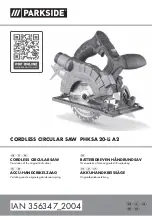
24
GB
17 Use extension cables for outdoors
–
Only use approved and appropriately identified
extension cables for use outdoors.
–
Only use cable reels in the unrolled state.
18 Remain attentive
–
Pay attention to what you are doing. Remain
sensible when working. Do not use the electric
tool when you are distracted.
19 Check the electric tool for potential damage
–
Protective devices and other parts must be
carefully inspected to ensure that they are fault-
free and function as intended prior to continued
use of the electric tool.
–
Check whether the moving parts function fault-
lessly and do not jam or whether parts are dam-
aged. All parts must be correctly mounted and
all conditions must be fulfilled to ensure fault-
free operation of the electric tool.
–
The moving protective hood may not be fixed
in the open position.
–
Damaged protective devices and parts must be
properly repaired or replaced by a recognised
workshop, insofar as nothing different is speci-
fied in the operating manual.
–
Damaged switches must be replaced at a cus-
tomer service workshop.
–
Do not use any faulty or damaged connection
cables.
–
Do not use any electric tool on which the switch
cannot be switched on and off.
20 ATTENTION!
–
The use of other insertion tools and other ac-
cessories can entail a risk of injury.
21
Have your electric tool repaired by a qualified
electrician
–
This electric tool conforms to the applicable
safety regulations. Repairs may only be per-
formed by an electrician using original spare
parts. Otherwise accidents can occur.
22 Do not use the cable for purposes for which it is
not intended Do not use the cable to pull the plug
out of the outlet. Protect the cable from heat, oil
and sharp edges.
Additional safety instructions
•
Wear safety gloves whenever you carry out any
maintenance work on the blade!
•
When cutting round or irregularly shaped wood,
use a device to stop the workpiece from twisting.
•
When cutting boards in upright position, use a
device to prevent kick-back.
•
A dust extraction system designed for an air ve-
locity of 20 m/s should be connected in order to
comply with woodworking dust emission values
and to ensure reliable operation.
•
Give these safety regulations to all persons who
work on the machine.
•
Do not use this saw to cut fire wood.
•
The machine is equipped with a safety switch to
prevent it being switched on again accidentally
after a power failure.
•
Before you use the machine for the first time,
check that the voltage marked on the rating plate
is the same as your mains voltage.
•
If you use a cable reel, the complete cable has
to be pulled off the reel.
•
Persons working on the machine should not be
distracted.
•
Note the direction of rotation of the motor and
blade.
•
Never dismantle the machineʼs safety devices
or put them out of operation.
•
Never cut workpieces which are too small to
hold securely in your hand.
•
Never remove loose splinters, chips or jammed
pieces of wood when the saw blade is running.
•
It is imperative to observe the accident preven-
tion regulations in force in your area as well as
all other generally recognized rules of safety.
•
Note the information published by your profes-
sional associations.
•
Adjustable protective devices have to be adjust-
ed as close as possible to the workpiece.
•
Important! Support long workpieces (e.g. with
a roller table) to prevent them sagging at the
end of a cut.
•
Make sure the blade guard (3) is in its lower po-
sition when the saw is being transported.
•
Safety guards are not to be used to move or mis-
use the machine.
•
Blades that are misshapen or damaged in any
way must not be used.
•
If the table insert is worn, replace it.
•
Never operate the machine if either the door pro-
tecting the blade or the detachable safety device
are open.
•
Ensure that the choice of blade and the selected
speed are suitable for the material to be cut.
•
Do not begin cleaning the blade until it has come
to a complete standstill.
•
For straight cuts of small workpieces against the
longitudinal limit stop the push stick has to be
used.
•
The bandsaw blade guard should be in its low-
est position close to the bench during transport.
•
For miter cuts when the table is tilted, the par-
allel stop must be positioned on the lower part
of the table.
•
When cutting round timber, use a suitable hold-
ing device to prevent the workpiece turning.
•
Never use guards to lift or transport items.
•
Ensure that the bandsaw blade guards are used
and correctly adjusted.
•
Keep your hands a safety distance away from
the bandsaw blade. Use a push stick for nar-
row cuts.
•
The push stick has to be stored on the intended
device, so that it can be reached from normal
working position and is always ready to be used.
•
In the normal operating position the operator is
in front of the machine.
Summary of Contents for 39015049933
Page 2: ......
Page 3: ...1 9 Fig 1 2 3 4 5 6 7 8 10 13 11 12 Fig 4 D D C B Fig 2 A Fig 3 Fig 5 F I E J 14...
Page 5: ...Fig 11 50 51 Fig 12 53 52 52 53 8 J 5 Fig 13 6 5 Fig 14...
Page 6: ...4 6 5 4 6 Fig 15 Fig 16...
Page 7: ......
Page 19: ...19 D...
Page 43: ...43...
Page 44: ......
















































